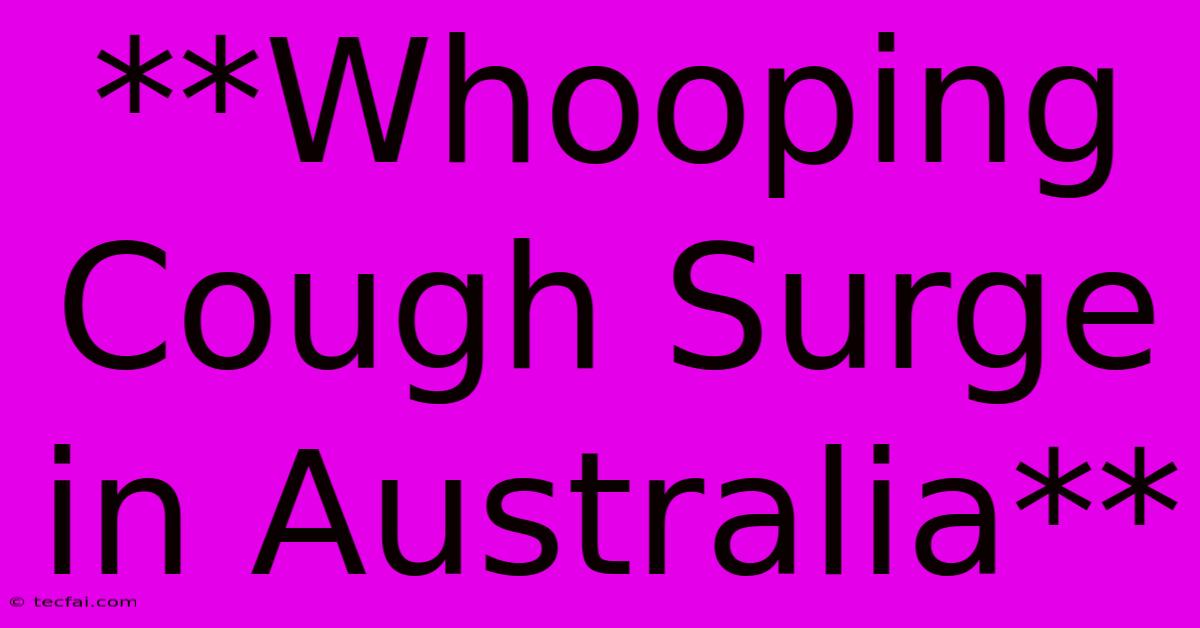**Whooping Cough Surge In Australia**

Discover more detailed and exciting information on our website. Click the link below to start your adventure: Visit Best Website tecfai.com. Don't miss out!
Table of Contents
Whooping Cough Surge in Australia: A Growing Concern for Parents and Health Officials
Australia is experiencing a concerning rise in whooping cough cases, prompting a renewed focus on vaccination and public health awareness. The highly contagious respiratory illness, caused by the bacterium Bordetella pertussis, is particularly dangerous for infants and young children, leading to serious complications and even death.
Understanding the Current Situation
The recent surge in whooping cough cases has become a significant public health issue, with reported cases exceeding historical trends. This increase has been attributed to several factors:
- Declining vaccination rates: While Australia boasts a high overall vaccination rate, there has been a slight dip in pertussis vaccine uptake in recent years, leaving some vulnerable to infection.
- Waning immunity: The protection provided by the pertussis vaccine can wane over time, making adults and older children susceptible to infection and potentially spreading it to infants.
- Increased awareness: Enhanced awareness and improved diagnostic tools have likely contributed to a higher number of reported cases, as more infections are being detected and confirmed.
Who is Most at Risk?
Infants under one year old are particularly vulnerable to severe whooping cough complications, including pneumonia, seizures, brain damage, and even death. This is because their immune systems are not fully developed, and they cannot be fully vaccinated until they are six months old.
However, the illness can affect people of all ages. While adults may experience milder symptoms, they can still transmit the infection to vulnerable individuals.
The Symptoms of Whooping Cough
Whooping cough is characterized by a distinctive, forceful cough that sounds like a "whoop." Other symptoms may include:
- Runny nose
- Low-grade fever
- Difficulty breathing
- Vomiting
- Fatigue
It's important to note that the "whoop" may not always be present, especially in infants and young children. If you suspect someone may have whooping cough, it's crucial to seek medical attention immediately.
Prevention and Treatment
The most effective way to protect against whooping cough is through vaccination. The pertussis vaccine is highly effective in preventing the disease and its complications.
- Infants: It's recommended to get a series of pertussis vaccinations starting at two months of age.
- Children: Booster doses are given at four, six, and 18 months, and again at four to six years old.
- Adults: It's important to ensure you are up-to-date on your pertussis vaccinations, particularly if you are around infants or young children.
Treatment for whooping cough typically involves antibiotics. This can help reduce the severity of symptoms and prevent the spread of the infection.
What You Can Do
- Stay informed: Keep up-to-date on the latest information regarding whooping cough outbreaks and vaccination recommendations.
- Get vaccinated: Ensure you and your family members are fully vaccinated against pertussis.
- Practice good hygiene: Wash your hands frequently, cover your mouth and nose when coughing or sneezing, and avoid close contact with people who are sick.
- Be vigilant: If you or someone you know is experiencing symptoms of whooping cough, seek medical attention immediately.
The recent surge in whooping cough cases serves as a stark reminder of the importance of vaccination and public health measures. By taking these steps, we can help protect ourselves, our families, and our communities from this potentially serious illness.

Thank you for visiting our website wich cover about **Whooping Cough Surge In Australia**. We hope the information provided has been useful to you. Feel free to contact us if you have any questions or need further assistance. See you next time and dont miss to bookmark.
Featured Posts
-
Fc Noah Crushed By Chelsea 8 0 Nov 8
Nov 08, 2024
-
Actors Transformation Baffles The One Show
Nov 08, 2024
-
Kasong Estafa Ken Chan At 7 Suspek
Nov 08, 2024
-
Nfl Midseason Awards Rb Moves Qbs Shine
Nov 08, 2024
-
Chelsea Hammer Noah 8 0 In League Match
Nov 08, 2024
